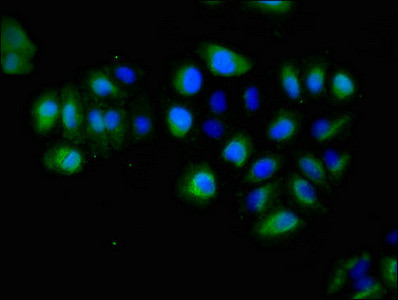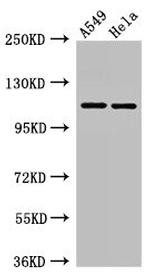Search Thermo Fisher Scientific
Product Details
PA5-112413
Species Reactivity
Host/Isotype
Class
Type
Immunogen
Conjugate
Form
Concentration
Purification
Storage buffer
Contains
Storage conditions
Shipping conditions
RRID
Target Information
EPHA5 belongs to the ephrin receptor subfamily of the protein tyrosine kinase family. EPH and EPH-related receptors have been implicated in mediated developmental events, particularly in the nervous system. Protein kinases are enzymes that transfer a phosphate group from a phosphate donor, generally the g phosphate of ATP, onto an acceptor amino acid in a substrate protein. By this basic mechanism, protein kinases mediate most of the signal transduction in eukaryotic cells, regulating cellular metabolism, transcription, cell cycle progression, cytoskeletal rearrangement and cell movement, apoptosis, and differentiation. The tyrosine kinase (TK) group is mainly involved in the regulation of cell-cell interactions such as differentiation, adhesion, motility and death. There are currently about 90 TK genes sequenced, 58 are of receptor protein TK (e. g. EGFR, EPH, FGFR, PDGFR, TRK, and VEGFR families), and 32 of cytosolic TK (e. g. ABL, FAK, JAK, and SRC families).
For Research Use Only. Not for use in diagnostic procedures. Not for resale without express authorization.
References (0)
Bioinformatics
Protein Aliases: ARCC2; Brain-specific kinase; CTPA; CTPP1; ECK; EHK-1; EK7; epa5; EPH homology kinase 1; EPH-like kinase 7; Ephrin A2; Ephrin A5; Ephrin type-A receptor 5; EphrinA2; EphrinA5; receptor protein-tyrosine kinase HEK7; tyrosine-protein kinase receptor EHK-1
Gene Aliases: BSK; CEK7; EHK-1; EHK1; EK7; EPHA5; HEK7; TYRO4
UniProt ID: (Human) P54756
Entrez Gene ID: (Human) 2044

Performance Guarantee
If an Invitrogen™ antibody doesn't perform as described on our website or datasheet,we'll replace the product at no cost to you, or provide you with a credit for a future purchase.*
Learn more
We're here to help
Get expert recommendations for common problems or connect directly with an on staff expert for technical assistance related to applications, equipment and general product use.
Contact tech support



